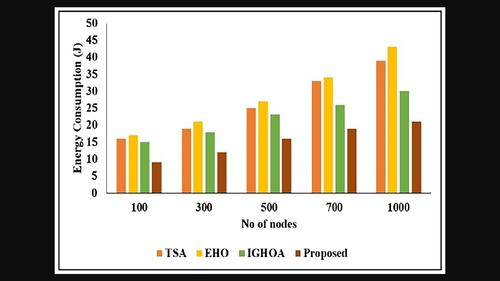当前位置:
X-MOL 学术
›
Int. J. Commun. Syst.
›
论文详情
Our official English website, www.x-mol.net, welcomes your feedback! (Note: you will need to create a separate account there.)
IoT energy efficiency routing protocol using FHO-based clustering and improved CSO model-based routing in MANET
International Journal of Communication Systems ( IF 2.1 ) Pub Date : 2024-03-07 , DOI: 10.1002/dac.5756 Shridhar Sanshi 1 , Karthik N 2 , Ramesh Vatambeti 3
International Journal of Communication Systems ( IF 2.1 ) Pub Date : 2024-03-07 , DOI: 10.1002/dac.5756 Shridhar Sanshi 1 , Karthik N 2 , Ramesh Vatambeti 3
Affiliation

|
Many protocols, services, and electrical devices with built-in sensors have been developed in response to the rapid expansion of the Internet of Things. Mobile ad hoc networks (MANETs) consist of a collection of autonomous mobile nodes that can form an ad hoc network in the absence of any pre-existing infrastructure. System performance may suffer due to the changeable topology of MANETs. Since most mobile hosts operate on limited battery power, energy consumption poses the biggest challenge for MANETs. Both network lifetime and throughput improve when energy usage is reduced. However, existing approaches perform poorly in terms of energy efficiency. Scalability becomes a significant issue in large-scale networks as they grow, leading to overhead associated with routing updates and maintenance that can become unmanageable. This article employs a MANET routing protocol combined with an energy conservation strategy. The clustering hierarchy is used in MANETs to maximize the network's lifespan, considering its limited energy resources. In the MANET communication process, the cluster head (CH) is selected using Fire Hawk Optimization (FHO). When choosing nodes to act as a cluster for an extended period, CH election factors in connectivity, mobility, and remaining energy. This process is achieved using an optimized version of the Ad hoc On-Demand Distance Vector (AODV) routing protocol, utilizing Improved Chicken Swarm Optimization (ICSO). In comparison to existing protocols and optimization techniques, the proposed method offers an extended network lifespan ranging from 90 to 160 h and reduced energy consumption of 80 to 110 J, as indicated by the implementation results.
中文翻译:

在 MANET 中使用基于 FHO 的集群和改进的基于 CSO 模型的路由的物联网能效路由协议
为了应对物联网的快速扩张,人们开发了许多带有内置传感器的协议、服务和电气设备。移动自组织网络 (MANET) 由一组自主移动节点组成,这些节点可以在没有任何预先存在的基础设施的情况下形成自组织网络。由于 MANET 的拓扑变化,系统性能可能会受到影响。由于大多数移动主机的电池电量有限,因此能源消耗对 MANET 构成了最大的挑战。当能源使用量减少时,网络寿命和吞吐量都会提高。然而,现有方法在能源效率方面表现不佳。随着大规模网络的发展,可扩展性成为一个重要问题,导致与路由更新和维护相关的开销变得难以管理。本文采用了与节能策略相结合的MANET路由协议。考虑到其有限的能源资源,MANET 中使用集群层次结构来最大限度地延长网络的使用寿命。在MANET通信过程中,使用火鹰优化(FHO)来选择簇头(CH)。当选择节点长期充当集群时,CH 选举会考虑连接性、移动性和剩余能量。此过程是使用 Ad hoc 按需距离矢量 (AODV) 路由协议的优化版本以及改进的鸡群优化 (ICSO) 来实现的。实施结果表明,与现有协议和优化技术相比,所提出的方法可将网络寿命延长90至160小时,并将能耗降低80至110 J。
更新日期:2024-03-12
中文翻译:

在 MANET 中使用基于 FHO 的集群和改进的基于 CSO 模型的路由的物联网能效路由协议
为了应对物联网的快速扩张,人们开发了许多带有内置传感器的协议、服务和电气设备。移动自组织网络 (MANET) 由一组自主移动节点组成,这些节点可以在没有任何预先存在的基础设施的情况下形成自组织网络。由于 MANET 的拓扑变化,系统性能可能会受到影响。由于大多数移动主机的电池电量有限,因此能源消耗对 MANET 构成了最大的挑战。当能源使用量减少时,网络寿命和吞吐量都会提高。然而,现有方法在能源效率方面表现不佳。随着大规模网络的发展,可扩展性成为一个重要问题,导致与路由更新和维护相关的开销变得难以管理。本文采用了与节能策略相结合的MANET路由协议。考虑到其有限的能源资源,MANET 中使用集群层次结构来最大限度地延长网络的使用寿命。在MANET通信过程中,使用火鹰优化(FHO)来选择簇头(CH)。当选择节点长期充当集群时,CH 选举会考虑连接性、移动性和剩余能量。此过程是使用 Ad hoc 按需距离矢量 (AODV) 路由协议的优化版本以及改进的鸡群优化 (ICSO) 来实现的。实施结果表明,与现有协议和优化技术相比,所提出的方法可将网络寿命延长90至160小时,并将能耗降低80至110 J。



























 京公网安备 11010802027423号
京公网安备 11010802027423号